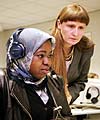|
plural nouns |
||
 |
||||||
|
Steve from Hong Kong writes: When should I use material (singular) and materials (plural)? I've seen the phrases materials development and teaching material. So when should I use the plural form?
|
| Roger Woodham replies: | ||
|
material / materials as nouns In your two examples, Steve, material and materials feature as part of compound nouns relating to the teaching of a school subject. It would always be plural in the first example, materials development, because we are thinking of a range of materials or of a large project which has many elements. In the second example, it could be singular or plural. We speak of both teaching material or teaching materials, depending on how narrowly or broadly we are thinking of them. Whether we use material in the singular or the plural depends on the context of use. When we are thinking of equipment or a number of things that you need for a particular activity, it could be used in the singular, but would normally be used in the plural:
When material refers to ideas that you can use as a basis for an article, a book, a play or a film, it is normally used in the singular:
Note
that even when material is used in the singular here, it
has a plural sense.
|
|
material / immaterial as adjectives Note that material can also be used as an adjective.
Material here has a quite specific meaning and refers to evidence or information which is relevant to a court case. The negative adjectival form immaterial is used much more widely and refers to things which are not considered important to what you are talking about:
|
||||
|
collective nouns Nouns which refer to a group of people or things are often called collective nouns. Some of the most common include:
The names of many organisations are also collective nouns. For example:
When you use a collective noun, it may be followed by either a singular or plural verb, depending on whether you are thinking of the group as a unit, in which case it will be singular, or as a number of individuals, in which case it will be plural:
|
||||||||||||||||||
|
plural nouns Nouns relating to certain things people wear, certain things they use or certain things they value are normally found in the plural. They include:
These nouns are normally used with plural verbs.
Note that when you want to refer to single pieces of clothing or single items of use, you must insert a pair of / two pairs of / etc in front of the noun:
|
|||||||||||||||||||||